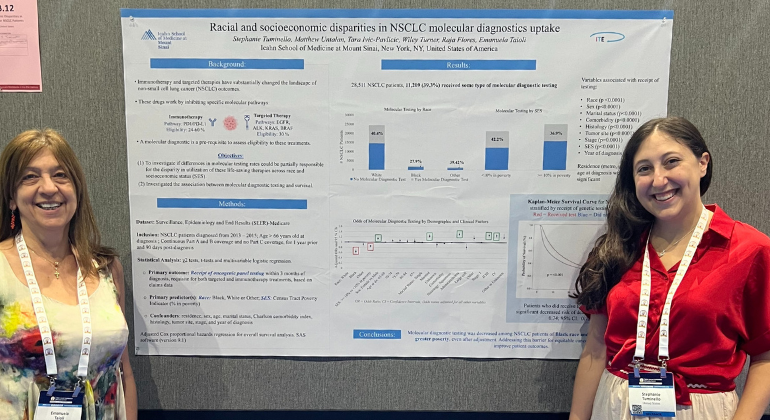New Mount Sinai Study Reveals Disparities in Lung Cancer Testing
Patients face big differences in getting important tests based on their race and income

Emanuela Taioli, MD, PhD and Stephanie Tuminello, PhD, MPH present their research at the 2024 World Conference on Lung Cancer.
A new Mount Sinai study published in the Journal of the National Cancer Institute on September 10, 2024, has found that people with lung cancer face big differences in getting important tests based on their race and income. This study, led by Emanuela Taioli, MD, PhD, and her team at the Institute for Translational Epidemiology at the Icahn School of Medicine at Mount Sinai, shows a serious concern in cancer care.
The researchers used data from SEER-Medicare, which reflects the linkage of two large population-based sources of data that provide detailed information about Medicare beneficiaries with cancer, to find out that not everyone has the same chance to get a special test called molecular diagnostics. This test helps doctors decide whether a patient can use new, targeted treatments for lung cancer. Some groups of people--those from lower-income or minority backgrounds--were less likely to get these tests.
“In order to significantly reduce lung cancer mortality, novel effective treatments should be available to all patients who could benefit from such treatments,” says Taioli.
Dr. Taioli and her team from Icahn Mount Sinai, including Stephanie Tuminello, PhD, MPH; Wiley M. Turner, BA; Matthew Untalan, MPH; Tara Ivic-Pavlicic, MS; and Raja Flores, MD, PhD, observed that without these tests, some patients might not get access to life-saving treatments. This is a big concern because while new treatments for late-stage lung cancer can be very effective, they are not equally available to everyone.
“The results of this study are important because they show that if we can fix these gaps in testing, more people will be able to get the treatments they need and improve their chances of survival,” said Dr. Tuminello. “For doctors, this means they need to make sure that everyone has equal access to these important tests. For patients, especially those from lower-income or minority backgrounds, it means there’s a need for better access to treatments that can improve their health and improve their chances of survival.”
The researchers hope their findings will lead to changes that make sure everyone has the same chance to get these important tests. This work was funded in part by a cancer disparities grant from the National Cancer Institute. It aims to help make cancer care fairer for everyone.
About the Mount Sinai Health System
Mount Sinai Health System is one of the largest academic medical systems in the New York metro area, with 48,000 employees working across seven hospitals, more than 400 outpatient practices, more than 600 research and clinical labs, a school of nursing, and a leading school of medicine and graduate education. Mount Sinai advances health for all people, everywhere, by taking on the most complex health care challenges of our time—discovering and applying new scientific learning and knowledge; developing safer, more effective treatments; educating the next generation of medical leaders and innovators; and supporting local communities by delivering high-quality care to all who need it.
Through the integration of its hospitals, labs, and schools, Mount Sinai offers comprehensive health care solutions from birth through geriatrics, leveraging innovative approaches such as artificial intelligence and informatics while keeping patients’ medical and emotional needs at the center of all treatment. The Health System includes approximately 9,000 primary and specialty care physicians and 10 free-standing joint-venture centers throughout the five boroughs of New York City, Westchester, Long Island, and Florida. Hospitals within the System are consistently ranked by Newsweek’s® “The World’s Best Smart Hospitals, Best in State Hospitals, World Best Hospitals and Best Specialty Hospitals” and by U.S. News & World Report's® “Best Hospitals” and “Best Children’s Hospitals.” The Mount Sinai Hospital is on the U.S. News & World Report® “Best Hospitals” Honor Roll for 2025-2026.
For more information, visit https://www.mountsinai.org or find Mount Sinai on Facebook, Instagram, LinkedIn, X, and YouTube.